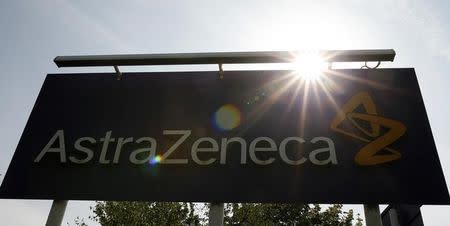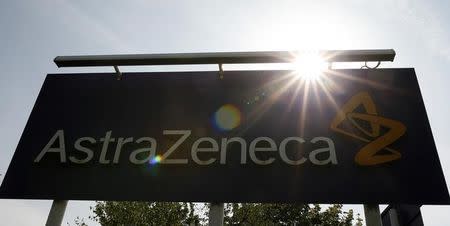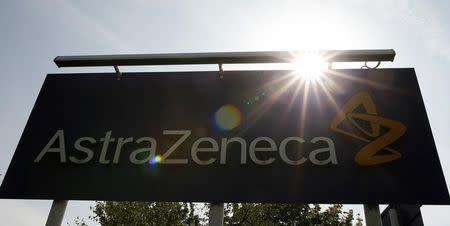AstraZeneca touts independence as Nexium drug keeps on giving
By Ben Hirschler
LONDON (Reuters) - AstraZeneca, which saw off a $118 billion bid from Pfizer in May, said quarterly results showed its standalone strength, while recent U.S. tax changes removed much of the case for a new takeover attempt.
Britain's second biggest drugmaker raised its 2014 sales forecast for the second quarter in a row on Thursday, helped by the delayed U.S. launch of generic copies of Nexium, which kept cash flowing from the heartburn and ulcer drug.
It now expects sales to grow in low single digits at constant exchange rates this year, after previously predicting they would be flat. The upgrade follows better-than-expected revenue in the third quarter, helped by the Nexium factor.
Chief Executive Pascal Soriot, who has fought hard to prove AstraZeneca does not need the kind of mega-merger offered by Pfizer, said he would use the better financial outlook to speed up investment in the company's promising pipeline of new drugs.
Soriot also argued that U.S. government tax changes undermined the rationale for companies to shift their tax bases overseas by striking so-called inversion deals, as Pfizer planned to do by buying AstraZeneca.
"The U.S. rules have certainly raised the bar for tax inversions for all companies that are considering tax inverting. They almost entirely remove the tax benefits," he told reporters. "It makes a tax inversion much less attractive."
The collapse of AbbVie's planned $55 billion acquisition of Shire, in another deal driven by tax considerations, also highlighted the tax hazards, he added.
Pfizer has not revealed whether it would consider a new run at AstraZeneca but CEO Ian Read said last week he believed tax inversions could still be an option.
Under British takeover rules, Pfizer can make a new public offer for AstraZeneca from Nov. 26. Some investors think the U.S. company will return, while others are sceptical.
"The likelihood of a bid has receded since the collapse of the AbbVie bid for Shire and the decision of Pfizer management to commence a $11 billion share buyback programme," said Ketan Patel, an analyst at Ecclesiastical Investment Management.
Shares in AstraZeneca fell 1.8 percent by 1240 London time, while the European healthcare sector lost 1.2 percent.
FLOOR UNDER 2015 EARNINGS
Soriot sought to reassure shareholders new investments would be managed carefully by predicting that earnings next year would be no worse than the lower end of the range expected for 2014.
"Cost control will likely be a major focus in 2015 as the company tries to mitigate the damage of finally losing Nexium in the U.S.," said Berenberg Bank analyst Alistair Campbell.
The company will also get an upfront payment of $325 million from Aegerion Pharmaceuticals, after agreeing to sell the U.S. company its rare disease drug Myalept in a move designed to sharpen its focus on core disease areas.
AstraZeneca now expects "core" earnings per share (EPS), which exclude some items, to fall around 10 percent this year at constant rates. That is better than anticipated previously, but is offset by an anticipated currency hit of about 5 percent.
Deutsche Bank analyst Mark Clark said market forecasts for EPS were likely to be adjusted down by a few percent for 2014 and up a small amount for 2015, though this was "of limited relevance to the long term pipeline-led return to growth story".
Although the pipeline momentum is certainly building, AstraZeneca still faces major challenges, with a raft of patent expiries expected to pressure sales and profits until 2017, according to analyst forecasts.
That reflects loss of exclusivity on AstraZeneca's top-selling cholesterol-lowering drug Crestor in 2016, as well as the coming hit from competition to Nexium, which is expected to have its biggest impact in 2015.
AstraZeneca now assumes, for planning purposes, that no generic versions of Nexium will reach the U.S. market in 2014.
Ranbaxy Laboratories holds the rights to sell the first generic copy of the popular drug but its continuing problems with meeting regulatory standards in manufacturing have delayed a launch.
The Indian company said on Thursday the U.S. Food and Drug Administration had revoked the previously granted tentative approval for its generic version of Nexium.
Soriot said he was "not totally sure" how to read the Ranbaxy announcement but AstraZeneca still assumed no Nexium generics in the United States this year.
BUILDING UP DEFENCES
In recent months, Soriot has won more credit for building up the company's new drug pipeline.
The biggest hopes are centred on cancer, where AstraZeneca is vying with rivals such as Bristol-Myers Squibb, Merck & Co and Roche in the hot area of immunotherapy treatments, which boost the immune system to fight tumours.
AstraZeneca presented promising early drug data at a cancer conference in September and more results are expected at an investor day on Nov. 18, eight days before Pfizer could return.
The investor day is seen as an opportunity to shore up defences and maximise value from the pipeline. Analysts believe AstraZeneca is likely to give details of new experimental drugs that are set to enter clinical trials.
Sales in the third quarter rose 5 percent to $6.54 billion, generating core earnings down 13 percent at $1.05 a share.
Industry analysts, on average, had forecast sales in the quarter of $6.41 billion and earnings of $1.03 a share, according to Thomson Reuters.
(Editing by Keith Weir and Clara Ferreira Marques)





